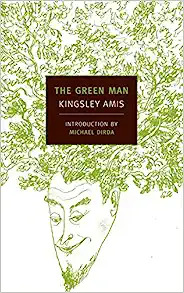
The Green Man by Kingsley Amis. Introduction by Michael Dirda.
New York Review Books Classics
Review by Warner Holme: Kingsley Amis’ The Green Man is a strange little enigma of a book that features potential hauntings and actual alcoholic breakdowns, it’s somehow one of the most appropriately bizarre examples of the man’s work to be published.
As soon as the first proper story page, one can see that as much as Amis is respected as literary these days he references the likes of Brian W. Aldiss and Harry Harrison directly in his work. Both quality authors, and listed amongst other talented individuals, but people who are very much remembered as authors of genre fiction within their respected boxes rather than seen as part of the respectable literary movements of their time.
The subject matter is fairly simple, centering around a middle-aged man named Maurice Ellington who takes over running an inn after the death of his father and starts seeing the ghosts occasionally claimed to haunt the place. Fighting his health problems, disagreements with his family, and substance abuse he struggles to find a path through this strange new situation in a book that is not entirely a metaphor for middle age and death.
The casual way, initially in a advertisement for the inn by the title name, that the subject of hauntings and ghosts are broached in this book is actually fairly realistic. While authors regularly try to add a mystique to the very concept of hauntings when a story will deal with them on the whole, the simple fact is that stories about a haunting in one area or another are common. Old, quaint, rustic, or idiosyncratic places will attract stories of ghosts, fairies, or other strange phenomena. For some it becomes a primary selling point, and for many others and acknowledged amusing little aspect. This is true enough in the present day United States, and was if anything more so in the United Kingdom of the 1960s.
Like a fair amount of clever genre fiction, one of the hardest things to detail about this book is tone. With cute winks and absurd yet realistic situations punctuating throughout the story, the idea that it is intended as a outright comedy might be considered. On the other hand the concern about losing one’s mind, the strange interactions with old stories and ideas, lend themselves to not only horror but folk horror. Elements of surrealism and even absurdism slip into the text, and yet it is far too straightforward most of the time to be seen strictly in those terms.
Overall the book is very much of its time. Libertine about sex and featuring a variety of people, it still goes out of its way on page 121 to be homophobic. On the other hand the lead character that the story focuses on, and thus takes on a certain level of his point of view, is himself deeply flawed at best. Whether this justifies the comments like this or not is quite up to the individual reader.
As with most releases from the New York Review of Books, this volume starts with a fairly thorough introduction. This particular piece is by Michael Dirda, who goes through everything from the influences that the author admitted to all the way to the aspects of this book which could have been argued as autobiographical. This includes material not only readily in the public record, but also amusing speculations by the writer of the introduction.
The Green Man is not the most traditional horror story, but is a definite example of that genre. Indeed featuring a man with substance abuse problems going through a breakdown and encountering ghosts while running an inn, one cannot help but suspect some forgotten influence on Stephen King. However there is more balance and rye and carefully constructed humor in this relatively brief book, and a general tone so unique to Amis that it has to be experienced.
(NY Review of Books, 2022)
Often shy and retiring Warner Holme has worn many hats over the years. He has worked in fields ranging from the medical to advertising, but always finds himself most at home among stories and words. He can usually be found in the mid-south, caring for some person or animal, and is almost never more than a meter away from a few books.
